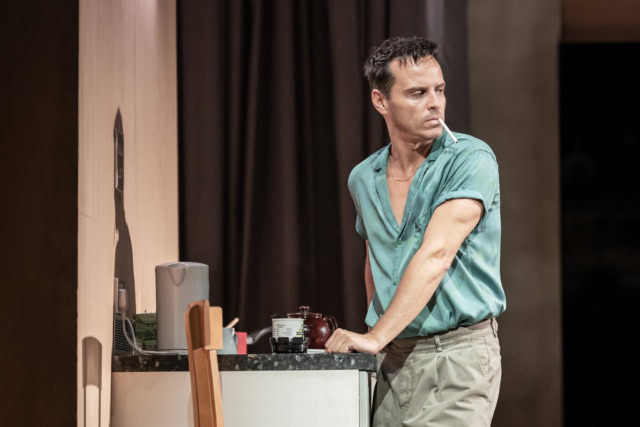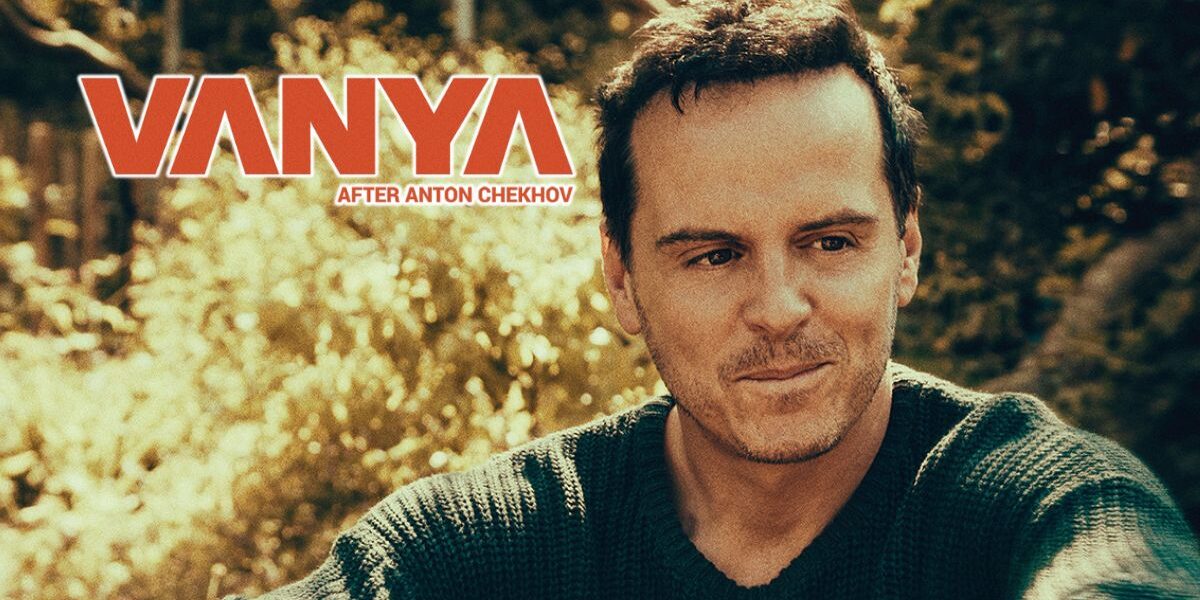Those who have been following my stage reviews know I’m a big proponent of live theater. There’s no experience like it. Unlike a film, the magic is happening right in front of you, on a platform where no performance is ever the same from one show to another. Every high moment and mistake is there for the audience to see, to participate in, creating a different type of relationship. However, a downside is having to be present to see these shows, meaning they aren’t always easily accessible. So when you’re able to see a taped performance of a live show, such as Vanya, it’s the next best thing.
Based on Anton Chekhov’s classic Uncle Vanya, Vanya is currently playing on screens worldwide, thanks to National Theatre Live, having recently played at the Duke of York’s Theatre in London. Vanya is adapted by Simon Stephens and Directed by Sam Yates, who also directed Magpie starring Daisy Ridley, which premiered at SXSW 2024.
Perhaps the most significant change is that Andrew Scott plays every part on stage, instead of an ensemble cast. As the only performer and co-creator, Scott carries this play on his shoulders.
[Warning: spoilers from Vanya are below!]
Vanya is a case study of humans and their relationships
I was unfamiliar with Chekhov’s Uncle Vanya, which is pretty much a retelling of another work, The Wood Demon. The original play explores the interconnectedness between four people and the emotions that become involved as they grow closer.
The major players in this version of the story are Alexander, an elderly filmmaker, his young second wife Helena, his daughter Sonia, the exhausted doctor Michael who has been called to the estate to provide some care, and of course Vanya. Andrew Scott plays a total of eight characters, each one with a distinct personality, mannerisms as well as patterns of speech.
Vanya brings these characters with larger-than-life personalities to the stage, allowing audience-goers a moment to sit down and experience life among them. The play is a case study of the human experience, which is perhaps one of the best parts of the entire show.
It’s not a super active play, with a gigantic story that moves from scene to scene. Instead, most of the play takes place in one room, with these characters conversing their way through difficult situations. Through this moment-by-moment exploration of these relationships, we learn so much about not just the characters, but also ourselves.

This feat is only amplified when you remember that every one of these characters is played by the same actor. One scene could see Scott jump between any of the eight characters, sometimes all of them, having to change his voice and his mannerisms very suddenly. It takes a high caliber of talent to be able to do, and Scott does it with such ease.
Switching between a gregarious character bouncing a tennis ball around the stage to a delicate, feminine character who fidgets with her necklace and speaks in a soft tone isn’t easy. I’ve heard stories about how difficult it can be to hold a single character when acting, let alone bouncing between extremes. It speaks to the talent that Andrew Scott has, as not many actors could do what he does live, night after night on stage.
A confusing narrative in this Anton Chekhov play
While the talent is impeccable here, there are quite a few downsides to this version of Chekhov’s play, the first being how much I struggled to follow along with the narrative. Part of this problem is that there doesn’t seem to be a specific narrative that connects Vanya from scene to scene; which is a result of the above-stated human case study that the play offers. Vanya is a narrow view into a specific point in these characters’ lives. The audience is getting a snapshot of each character in this exact moment, which doesn’t necessarily lend itself well to an overall narrative.
Instead, Vanya feels like it’s meandering through a story where not much happens. For some, this may be perfectly fine. However, I prefer a bit more story to my stage plays. Adding to the confusing nature of Vanya is the quick transitions that Andrew Scott has to manage throughout the show. At times, Scott switches between characters so quickly, that it becomes near impossible to discern who exactly he’s supposed to be. There’s one scene in particular where he’s sitting on a swing and switches between two characters, with barely enough time to switch the mannerisms that signify who exactly he’s playing.
As a result, I spent a good chunk of time unsure of what I was watching or what was going on throughout the play. I thought that it had something to do with it being an adapted Russian classic, which has never been one of my favorite genres, but it seems to be more reflective of the creative choices for this specific version of Uncle Vanya.
That being said, the work and effort put into this show by Andrew Scott is something spectacular to behold. There’s nothing quite like seeing someone who is not only great at acting, but loves what they are doing, and doing it well. Scott is in his element, with this being another successful role(s) among a long list of fantastic characters he’s brought to life.
Final thoughts on Andrew Scott’s Vanya
While I was a bit confused a few different times throughout Vanya, this version still feels like essential viewing for theater lovers. Now that I’ve seen it once, I think I would appreciate it more on additional viewings because I have a better understanding of what is going on and who exactly each one of these characters is.
The love and work that Andrew Scott put into this show are apparent from the first moment he arrives on stage. Vanya should be at the top of your viewing list. Vanya is currently in theaters. Do you plan on seeing it soon in theaters? Let us know on social media @mycosmiccircus.
To Kill A Mockingbird Brilliantly Stuns on North American Tour




